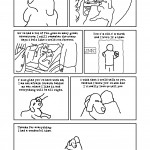Antimatter
What if everything was antimatter, EXCEPT Earth?
Sean Gallagher
This one doesn't end well for us. But—unlike most scenarios involving the word "antimatter"—the end is surprisingly slow and drawn-out.

The whole universe is matter, as far as we can tell. No one is sure why there's more antimatter than matter, since the laws of physics are pretty symmetrical, and so there's no reason to expect there to be more of one than the other.[1]Although when it comes down to it, there's no reason to expect anything at all.
It's possible that galaxies are made of antimatter, and we just haven't noticed because we haven't tried to touch them. This is a cool idea, but if there are zones of matter and zones of antimatter, we should see a telltale gamma-ray glow from the boundary between the zones. So far, we haven't seen that, although another telescope might help.

If the rest of the universe were swapped out for antimatter, we'd be in trouble. Outer space isn't really "space";[2]As far as I know, it really is "outer", for what that's worth. it's full of a thin gas.[3]Technically, plasma.[4]Technically, there's also a substantial quantity of solid grains of dust.[5]Look, there's a bunch of little bits that are hard to see, ok?.[6]Ok, they're not always hard to see.
The Earth's magnetic field protects us from the solar wind, and would protect us from an anti-solar wind, too. A tiny fraction of the particles from the Sun do reach the Earth, funneled down by our magnetic field, and create the aurora. In this scenario, the aurora would get a lot brighter, but most of the time not bright enough to really cause problems.
Meteorites would be the real problem.
The Earth sweeps up space dust as it travels around its orbit.[7]Unfortunately for us, antimatter is probably attracted to matter by gravity. About 100 tons of dust per day enters the atmosphere in the form of tiny grains, most weighing about 10^-5 grams. An additional similar average per-day amount arrives in giant clumps all at once.
This inflow of antimatter dust would collide with the top of our atmosphere and be annihilated. The interactions between the nuclei and antinuclei and protons and antiprotons would be complex,[8]A lot of the energy would be carried away by neutrinos. but the end result would be a lot of gamma rays, which would turn into a lot of heat. This steady flow of material (which would be worst around dawn, when your house was facing in the direction of Earth's motion).
The heat and light added by the antimatter would most likely be enough to tip the Earth into a "runaway greenhouse" scenario, turning the Earth into something resembling Venus.
But the big asteroids would get us first. Even a relatively small object like the Chelyabinsk meteor would deliver as much energy as the meteor that killed the dinosaurs.[9]Although it would deliver it to the top of the atmosphere, so in some ways it wouldn't be as bad. Fairly large asteroids enter the atmosphere every few months—mostly unnoticed. If they were all antimatter, each one would trigger a tremendous pulse of energy in the sky and ignite a massive firestorm.[10]If an antimatter meteor is large enough, encountering a cloud could launch some of it backward without completely destroying it. However, it's hard to come up with a practical scenario in which a meteor would exhibit this effect in Earth's atmosphere—unless it were so large that it would have basically destroyed the planet anyway.
Right now, it's still an open question whether any significant percentage of the stuff in the sky is made of antimatter. It's probably not, but we'd need to build another orbiting gamma-ray telescope to really be sure.
However, it's easy to use a telescope to rule out one possibility: That everything in the sky is antimatter.

If you have a telescope, maybe you can get that result published.








